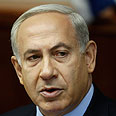
Prime Minister Benjamin Netanyahu
Photo: Gettyimages
The recent Security Cabinet deliberations, which were cut short on Wednesday by Prime Minister Benjamin Netanyahu
due to the fact that their content was leaked to the press,
focused on the Iranian threat,
which was defined by some members as being "very troubling" in light of Tehran's refusal to succumb to international pressure.
The meetings also addressed the IDF's capabilities in the face of Iran's efforts to conceal its nuclear work.
Related stories:
- Netanyahu, complaining of leaks, ends Iran meeting
- 'Iran information disturbing, not daunting'
- Obama: Chemical weapon would alter Syrian equation
A senior Security Cabinet member told Ynet following Wednesday's meeting that while the information Israel has on Iran's progress is troubling "It's not scary. The Iranians are relentlessly pursuing nuclear activities and they're not slowing down.
"They are holding their own vis-à-vis the international pressure, but on the other hand, they're not running wild," he said.
During the meeting the ministers were also briefed on the occurrences in Syria, Lebanon, Egypt and the rest of the Middle East. Intelligence officials expressed their fear of a flare-up in the region due to geo-political changes, including radicalization and Islamization.
Defense establishment officials claim President Bashar Assad's regime in Damascus is on the verge of collapse, while intelligence officials are concerned that Syria's chemical weapons will fall into the hands of the rebels or Hezbollah terrorists in Lebanon.
The intelligence officials told the ministers Israel is constantly monitoring chemical weapons caches in Syria, adding that any attempt to smuggle chemical weapons to Hezbollah or any other element may lead to an Israeli operation, which may result in an outbreak of violence along the northern border.
Intelligence information indicates that Hezbollah chief Hassan Nasrallah is enhancing the Shiite group's psychological warfare efforts against the Israeli public. Hezbollah has reached the conclusion that public discourse in Israel influences the decision-making process in the country and at times prevents leaders from making certain decisions.
In his speeches, Nasrallah is referring more and more to specific targets Hezbollah would attack in the event of a conflict with Israel.
- Receive Ynetnews updates
directly to your desktop















